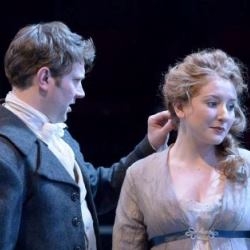Arcadia (Tobacco Factory Theatres, Bristol)
”Arcadia” comes across with great clarity and top-rate performances in another winner for Shakespeare at the Tobacco Factory

We know they can do Shakespeare. We know they can do Chekhov and Molière. Andrew Hilton‘s production of what for many of us is the finest play of the past 25 years proves without a doubt that they can do Stoppard too. This is Shakespeare at the Tobacco Factory’s first production of a contemporary work and they perform it as if to the manner born.
The play opens in 1809 in Sidley Hall, Derbyshire, where Septimus Hodge is tutor to the brilliant daughter of the house, Thomasina Coverly. Her mother, Lady Croom, is suffering as her gardens are being redesigned by her husband’s landscape architect, who wishes to transform her Park from a place of classical refinement to a Gothic semi-wilderness. Hodge’s old school-friend Lord Byron has been visiting too and both are a success with women: sex, "the attraction Newton left out", causes chaos and complications which will reverberate two centuries later.
These scenes alternate with ones set in the same room in the present day, where academics studying the period are trying to find out what happened and are getting it wrong. Hannah Jarvis is an expert on landscape and literature and sees the move away from classical garden design embodying Enlightenment values to Gothic cheap thrills as "the decline from thinking to feeling". Bernard Nightingale, a Byron scholar, is convinced the poet fought a duel and fled the country after killing the husband of one of his lovers. One of the descendants of the Coverlys, Valentine, is a PhD student whose work is at the cutting edge of physics. It seems that nearly 200 years earlier Thomasina may have been ahead of her time.
If this sounds daunting, don’t be worried. In performance it isn’t. Not only does the play contain some of Stoppard’s best jokes, it contains rich characters and perhaps the most touching love story in modern drama. For many years Stoppard was criticised for being all head and no heart. Arcadia makes a mockery of that claim and proves that he can do love and passion as well as anyone. And the beauty of the play is that it teaches you all you need to know to understand it. By end of the evening you will know enough about chaos theory, the Second Law of Thermodynamics and the history of garden design to understand how Stoppard uses them to convey his ideas on the importance of the quest for knowledge for its own sake, the conflict between the classical and romantic temperaments, and the mysteries of the universe.
The piece plays to many of the company’s strengths: complex language and ideas come across with great clarity, while the marriage of wit and romance, of scientific debate and death, suit a company which has always mastered the tonal shifts in Shakespeare and Chekhov with delicacy and skill.
Hilton elicits first-rate performances from his cast. As Septimus Hodge, Piers Wehner has the requisite charm and delivers some of the evening’s best lines with aplomb. Hannah Lee‘s Thomasina conveys both the passion of an intellectual genius and the excitement of a young woman discovering her emotions. Dorothea Myer-Bennett is convincing as a middle-aged mother still attractive to much younger men and bemused by the changes her daughter is undergoing: "Thirteen years and ten months. She is not due to be pert for six months at the earliest, or to have notions of taste for much longer."
The contemporary scenes don’t quite have the pace of the earlier ones yet, but Jack Wharrier is an outstanding Valentine, passionate about the excitement of being alive at a time "when almost everything you thought you knew is wrong". Polly Frame and Matthew Thomas spar entertainingly as the rival academics. If I had a complaint, it would be that some of the jokes get lost as they are delivered over audience laughter. It complements their production of As You Like It perfectly. I urge you to go.
Arcadia runs at the Tobacco Factory until 3 May 2014. For more info and tickets, click here.












